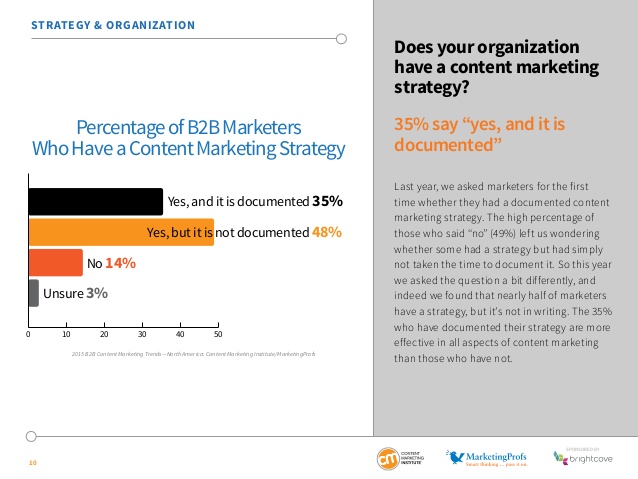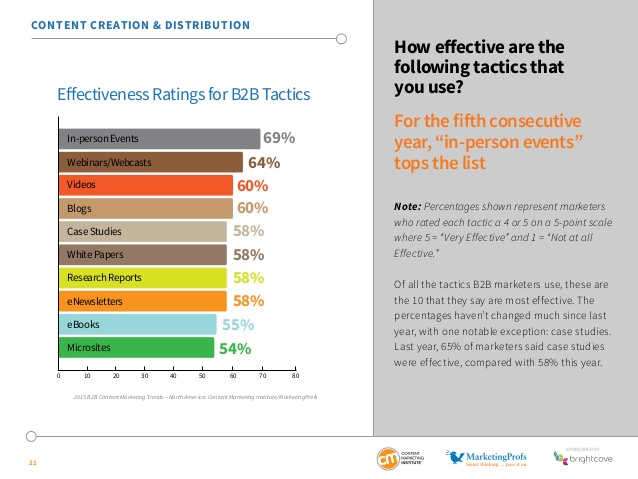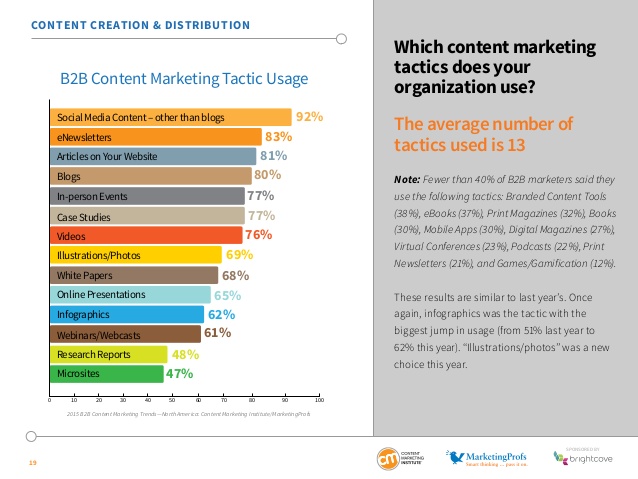If you’re a content marketer, please don’t get caught up in the bad habits marring this profession.
Instead, strive to be educated. Take the time to read industry literature, dig into your own content data, and learn to be even better at your profession, your craft, your job. It might just be worth it.
Experts say the people who participate in continuing education or learning about their field of work—by attending webinars and conferences, reading industry publications, and participating in forums—receive higher salaries or are in better positions to negotiate higher salaries.
So, for the sake of your career and the profession we hold dear, we’ve compiled a quick list of content marketing bad habits to avoid, based on new research and data from the Content Marketing Institute’s 2015 Benchmarks, Budgets and Trends Report. Side-step the common pitfalls of our profession, and craft a content strategy that circumvents these obstacles.
1. Only 21% of B2B marketers use an email newsletter. Tweet This Stat!
Email marketing is still a workhorse in digital marketing, and the newsletter is at the heart of this approach.
A recent study by Custora, a predictive analytics firm, found customer acquisition via email has quadrupled in the last four years and accounts for nearly 7% of customer acquisitions.
Looking into Kapost data, 3% of our monthly total lead volume stems from a weekly content marketing newsletter. May not sound like much, but it has a key impact. Anne Murphy, Senior Managing Editor of the Content Marketeer at Kapost writes the newsletter each week, and is responsible for it’s success. She says the newsletter is an important part of the “engagement” equation of nurturing leads.
“Every Friday we send our weekly newsletter to subscribers, and immediately, we see a spike in traffic to the website and social shares. It keeps prospects engaged but, more importantly, it drives them to take valuable action,” she says.
How to Do It on the Cheap
The best way to track effectiveness of email marketing is to buy marketing automation software like Eloqua, Pardot, or Marketo. But those can be quite pricey. Email providers like MailChimp or opt-in subscriptions that come with web hosting can be a cheaper alternative to keeping prospects engaged with your brand via email newsletters.
(P.S. please engage in the conversation: how do your email newsletters perform! Tell us in the comments below!)
2. More than half (62%) of marketers either (1) don’t have a content marketing strategy or (2) don’t have their strategy documented. Tweet This Stat!

If you simply write down your content strategy, it improves your overall success. Writing down a goal has long since been documented as a proven strategy to make ideas become realities.
There was an interesting study conducted with students from the 1979 Harvard MBA program. They were interviewed while they were students, then again ten years later. The results? The 13% of the class who had goals, but did not write them down earned twice the amount of the 84% who had no goals. The 3% who had written goals earned, on average, 10x as much as the other 97% of the class combined!
A similar song can be sung in content marketing. 35% of those with a documented strategy say they are successful at content marketing, compared to the 21% average for the total sample. You could say, then, that you have a 14% better chance to be successful at your job if you write down your strategy, than if you don’t.
Apply some simple math to this, and the results hit closer to home. Say you had $1M invested in the stock marketer, and suddenly you lost 14% of your total wealth. 14% of $1M is $140,000. Gone. Poof. Forget your lakeside vacation home.
How to Do It on the Cheap
Documenting a strategy doesn’t mean you’ve got to hire a content marketing strategy consultant. Follow Hive Chairman Ryan Allis’s advice in his 1200+ slide tomb of a presentation: write down your goals, frame them, and then hang them on the wall. That way, you’ll see them everyday, and so will your friends, colleagues and peers. It’ll remind you of your goals, and also hold you accountable.
3. For the 5th year in a row, B2B marketers ranked “in-person events” as the most effective marketing strategy, however only 77% are doing them. Tweet This Stat!

If you have an IQ above 80, you recognize the problem here. Only 3 in 4 content marketers are leveraging the power of in-person benefits, and are reaping the benefits and revenue associated with them. The other 23% are missing on a key revenue generating opportunity. In my opinion, this could be because in-person events often seem dauntingly costly.
But don’t be misled. In-person events don’t need to break the bank.
How to Do It on the Cheap
Live events don’t have to be a tens-of-thousands-of-dollars trade show. Things like brown-bag lunch sessions, customer support events, or even hosting local efforts like film tours or in-town speakers can draw potential customers, deepen relationships, and prompt networking opportunities that can lead to revenue down the line.
Be good at your job. Write down your content marketing strategy, include email newsletters, and think of ways to incorporate in-person events. You’ll be glad you did.


